As it happened: Day 4 of election petition
Hearing of an election petition by Amama Mbabazi went into its fourth day at the Supreme Court.
At Supreme Court
Presented by Joseph Kizza
@joekizza
Fourth day of the petition hearing
Second respondent (Electoral Commission) made submissions
Earlier on Wednesday, the first respondent made his submissions
Hearing taking place at Supreme Court in Kampala
|
6.20pm: COURT ADJOURNED
That's it for today at the Supreme Court. Court is adjourned until Friday, same time (9.30am). 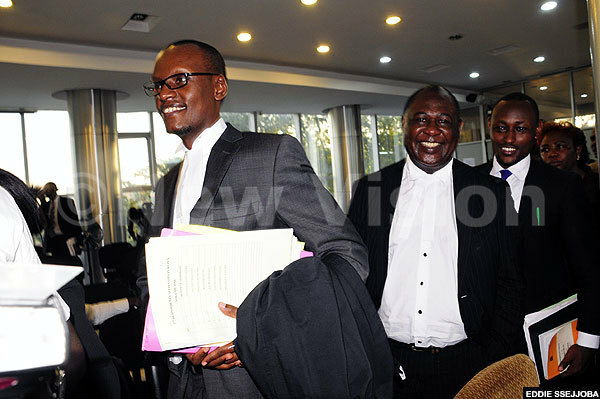
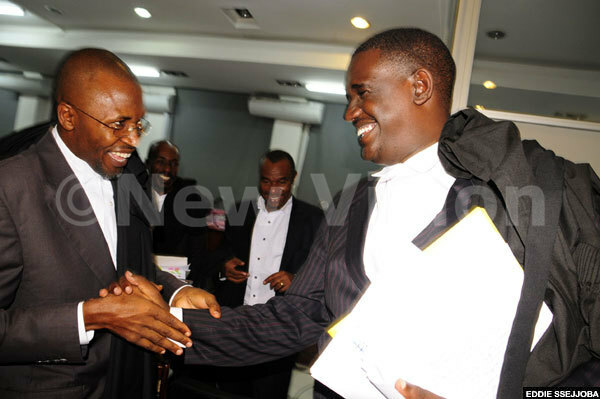
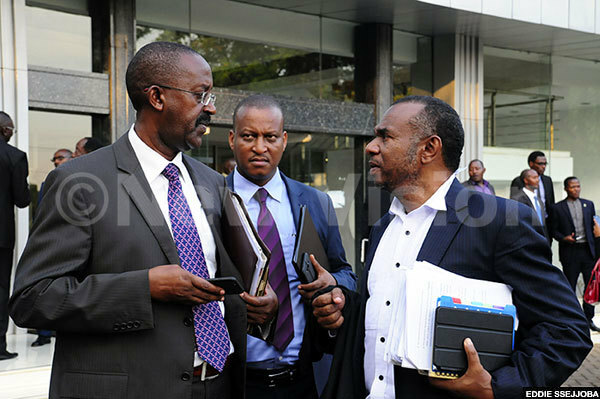
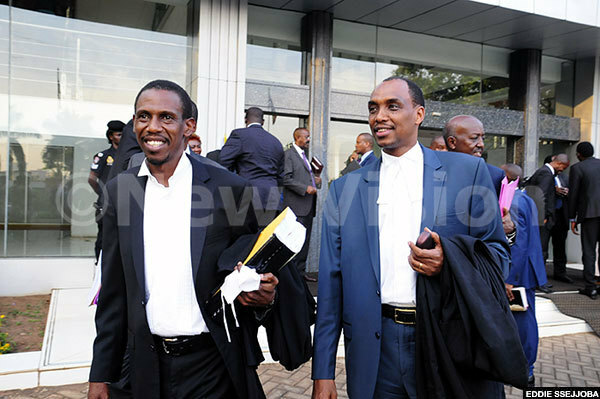
|
6.15pm: 'They all voted'
Karuhanga argues that the Electoral Commission protected the petitioner's vote, and that in the end, Amama Mbabazi got 1.43%.
"He is not even contesting that result," argues the lawyer. He also says that all the petitioner's witnesses cast their ballot and that Mbabazi does not present anyone who did not vote, regardless of how long they waited.
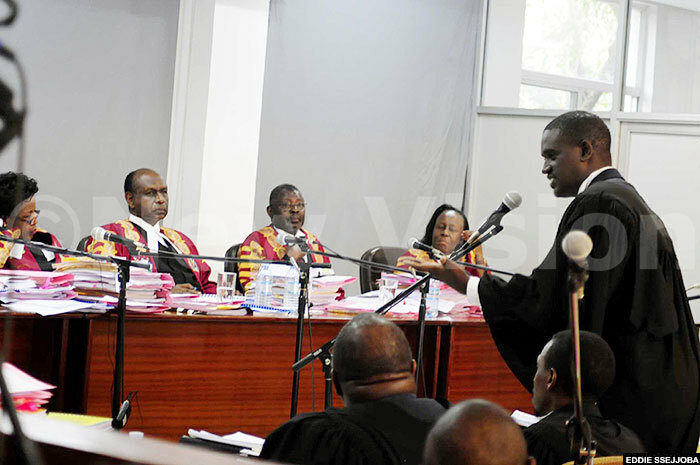
On delays . . .
"The Electoral Commission chairman Eng. Badru Kiggundu apologized for the delays. But what was the effect of the delays?" questions Counsel Karuhanga.
Counsel Karuhanga submits that if it had been that the delay of material disenfranchised the voters, Museveni would have still had more than 50% of the vote.
He rests his case by asking the bench to dismiss the petition with costs.
6.10pm: Mode of transmission
Saying that the transmission was done electronically, and not "by boda boda", Karuhanga argues that an election cannot be cancelled based on the mode of transmission.
He says that Mbabazi's petition is based on "two limbs", that is, the biometric technology.
On the DR forms, Karuhanga submits that a district returning officer is an agent of the Electoral Commission and that when he or she receives results, he or she receives them on behalf of the Electoral Commission.
6.05pm: 'Imaginary evidence'
Oryem gives way for fellow Electoral Commission lawyer Elison Karuhanga, who moves to respond to a submission by the petitioner's lawyer Jude Byamukama who he admits "submitted with eloquence".
He tells court that substantiality proctects the decision of voters and not a cheating candidate.
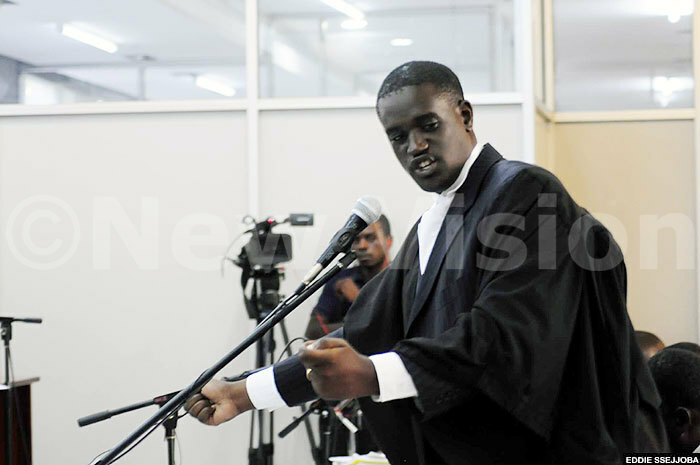
Substantiality protects the people's decision from annulment based on "flimsy and imaginary evidence" presented by the petitioner, argues Karuhanga.
5.50pm: The agents
As he continues to tackle issues to do with law, Oryem tells court that the law does not define on the role of an agent as regards ascertaining results.
Still on the issue of agents, Oryem tells court that candidate's agents cannot help to ascertain results at the national tally centre if they do not have a copy of results from the polling stations.
He cites Eng. Kiggundu's affidavit in which he says that Amama Mbabazi did not have polling agents at more than 50 per cent of the polling stations across the country.
His argument is that the petitioner had the right to appoint agents, but that by not doing so, it worked to his disadvantage . . . that he lost track of that phase of the electoral process.
Oryem also says that by being at the national tally centre at Namboole without DR forms to compare results, James and Duncan Mutogo are incompetent agents.
5.40pm: The law
The third Electoral Commission lawyer Okello Oryem is up next and his submission is on the issue of the law.
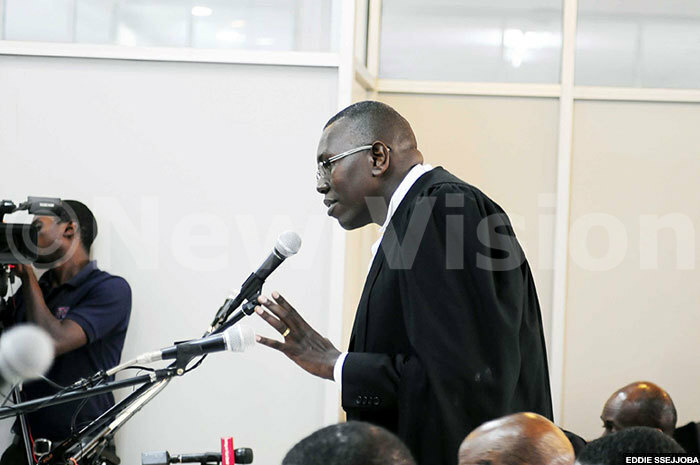
He says that the petitioner, Amama Mbabazi decided to invite court to revisit the requirement of proof of substantial effect. Oryem says that the argument by the petitioner seeking to shift the burden of proof and otherwise interpretation of law is "not tenable".
The lawyer reads from a ruling by former Chief Justice Benjamin Odoki which says that an election is not to be without irregularities. Odoki, in the ruling, says that court should establish whether the said irregularities adversely affected the outcome of the poll.
According to Oryem, the Supreme Court may depart from a previous decision only when it appears to be right to do so.
On non-compliance, Oryem argues that the petitioner provided no evidence from which the Supreme Court can assess the effect of alleged non-compliance. The duty of the court, he says, is to enforce Section 59 of the Presidential Elections Act as it is.
This Act, he tells court, codifies several control measures to ensure transparency. He also says that the principle of "One person, One vote" is in the Presidential Elections Act, adding that voting is done during day time.
All sections that relate to polling, in my view, codify principles of transparency, argues Oryem.
5.20pm: 'Lack merit'
So what about the issue of voting delays?
Counsel Kabega says that the second respondent "owned the mistake and took corrective measures". He explains that the issue of late delivery of voting materials was an administrative imperfection.
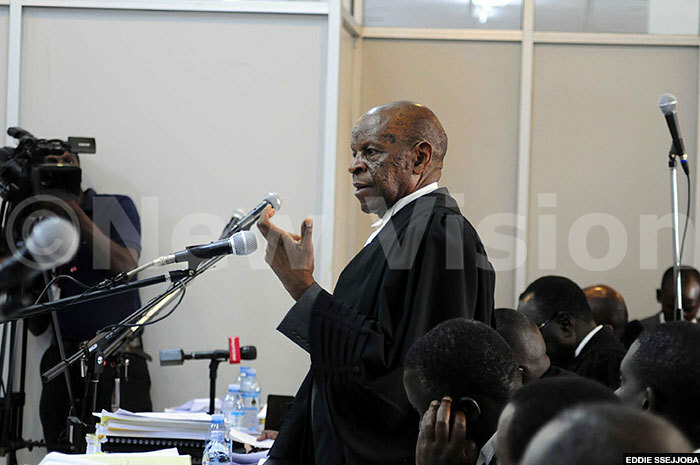
Kabega goes on to tell court that imperfection in a poll exercise is inevitable, emphasizing that "you can never be 100 per cent perfect in that process". In his submission, Kabega says that the Electoral Commission that he is defending should be judged on overall perfomrmance as opposed to just on the aspect of late deliveries in two (Wakiso and Kampala) out of 112 districts.
Kabega also tells the Supreme Court that when the petitioner visited the Electoral Commission offices, had he gone there with his own results, he would have compared with what the Electoral Commission had. There, argues the lawyer, the petitioner has not presented any convincing evidence to illustrate that the entire electoral process was flawed.
"The petitioner adduced no evidence to show that he had any evidence from his own DR forms and tally sheets to challenge the Electoral Commission results," argues Kabega.
He submits that the petition which he says lacks merit be dismissed with costs.
5.10pm: Museveni's nomination
Kabega says that Museveni was sponsored by the NRM party and was nominated on November 3, 2015 after complying with all the requirements. The Electoral Commission, he stresses, has no obligation to attend the NRM delegates' conference. It would be "forbidden territory" for Electoral Commission chairman Eng. Badru Kiggundu to dig into how a candidate was nominated by his or her party.
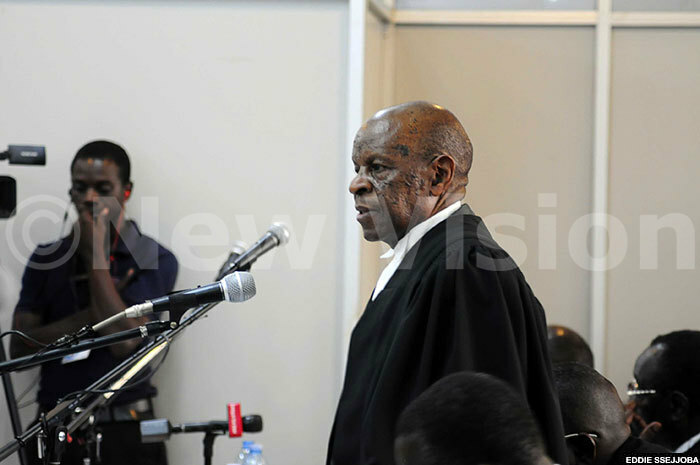
All that the elections body had to do was to ascertain communication from teh NRM and also see to it that the man being put forward to carry the party's flag had met the requirements, argues Kabega.
With this argument, the Electoral Commission lawyer submits that the petitioner presents no evidence to prove that Museveni's nomination was illegal.
5.00pm: Nation ID
On the matter of the national ID, Kabega submits that when the Electoral Commission adopted use of the national ID, for purposes of voting, that did in no way contravene any provisions of the law. In fact, argues Kabega, the law allows anybody to vote even if they have no voter's card, provided they are eligible and can be identified.
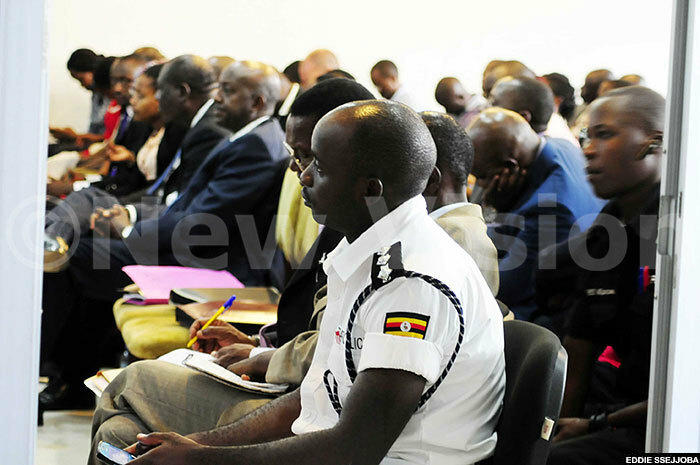
4.55pm: 'He never complained'
Kabega tells court that one of petitioner Amama Mbabazi's lawyers, Severino Twinobusingye, collected the petitioner's copy of the national voters' register.
He argues that since the petitioner did not raise any objection to the register at the time he received the copy (on November 25 last year), then the Supreme Court should dismiss the allegation.
At this point, the bench intervenes, with Justice Tumwesigye asking whether Kabega's point is that since the petitioner did not raise the complaint earlier then he should not raise it now.
The Electoral Commission lawyer responds that the reason the petitioner was given a copy of the voters' register at the time was for him to study the register and raise any issues he might have found.
Meanwhile, on the allegation of illegal nomination of Museveni, the lawyer tells court that the first respondent was rightly nominated and cites affidavits of NRM secretary general Justine Kasule Lumumba, EC boss Eng. Kiggundu and Wamala.
4.45pm: Hard + soft copies
Counsel Kabega starts off his submission by citing Wamala's affidavit, which indicates that every presidential candidate was availed with both soft and hard copies of the voters' register.
The veteran lawyer argues that since the petitioner, Amama Mbabazi, was among the eight presidential candidates, he was given copies of the register and has not raised any issue concerning that.
|
4.36pm: BACK IN THE COURTROOM
Court returns for the second part of today's afternoon session. Lawyer MacDusman Kabega will ride us through this lane. So, fasten your seatbelts, ladies and gentlemen.
|
4.20pm: Hot day, huh?
Oh yes, it certainly is!
But hey, he who knows best, sits near the fan . . .
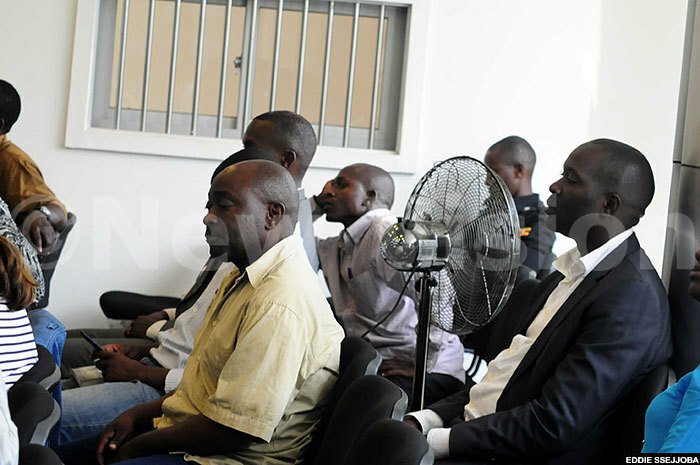
|
4.12pm: COURT BREAK
Court will be back in session in 30 minutes. Don't go far.
|
4.10pm: 'Agents were granted access'
Tumusiime concludes his submission by saying that the petitioner did not win the election and had no chance to win whatsoever. "If he is alleging that Museveni did not win the election, then who did?" questions Counsel Tumusiime.
A candidate is only declared winner when they have more than 50% votes. Museveni is the only candidate who scored over 50%, argues Tumusiime, and as such, the Electoral Commission carried out its duty to declare him winner.
4.05pm: 'Agents were granted access'
Tumusiime submits that the petitioner complains that his agents did not see information come through at the national tally centre at Namboole. He says that all candidates' agents were given full access to the national tally centre and given computers to monitor results.
And, he adds, no-one except Duncan Mutogo, disputed that the transmission system was corrupted.The Electoral Commission lawyer says that Mutogo's expertise is questionable.
And what about the alleged illegal tally centre at Naguru?
Tumusiime says that the source of information or the centre's specific location is not provided in the petition.
3.50pm: 'Is that what happened?'
On "illegal" declaration of Yoweri Museveni the winner, Counsel Tumusiime says that the petitioner does not know the electoral process, when he alleges so.
The Electoral Commission lawyer submits that the DR form was received in a transparent and tamper-proof envelope at the tally centre.
Mbabazi's lawyer Severino Twinobusingye intervenes: We are here to examine what happened and not what happens. This is a court hall, not a class.
"Let him [Tumusiime] do his submission and we (bench) shall be the judge of that," responds the Chief Justice.
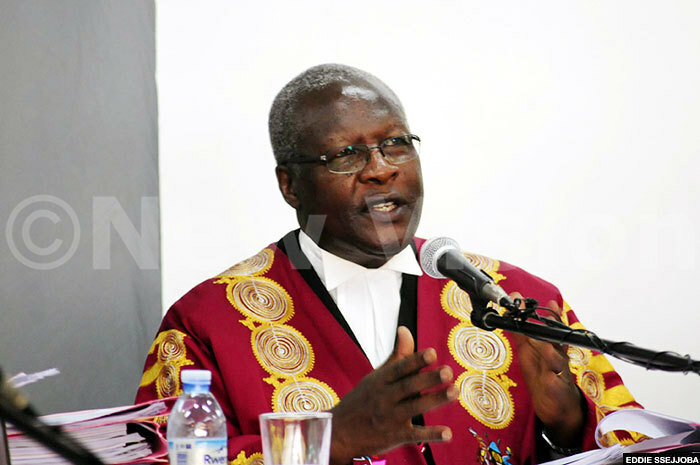
Chief Justice Katureebe asks the Electoral Commission lawyer if the procedures (of the electoral process) he is telling is that really happened.
"All this you are saying is what the law requires, but is that what happened?" Katureebe asks the Electoral Commissio to avail the petitioner with as many documents as they ask for.
Tumusiime says that the petitioner was given soft copies of the tally sheets per district and he says he second respondent will avail to the petitioner the hard copies
It is understood that EC's Namugera, whose affidavit has been referred to in this hearing, will appear in court on Friday.
3.25pm: 'No complaint'
Counsel Tumusiime says that no complaint has been filed by the petitioner concerning any malpractice to do with counting of votes in the February 18 elections. He points out that nowhere in the constitution or the Presidential Elections Act have they read that the Electoral Commission should transmit results using social media.
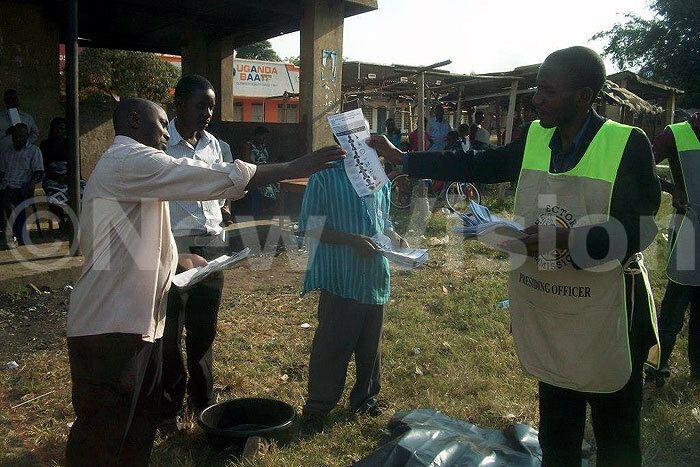
3.20pm: Keenly following . . .
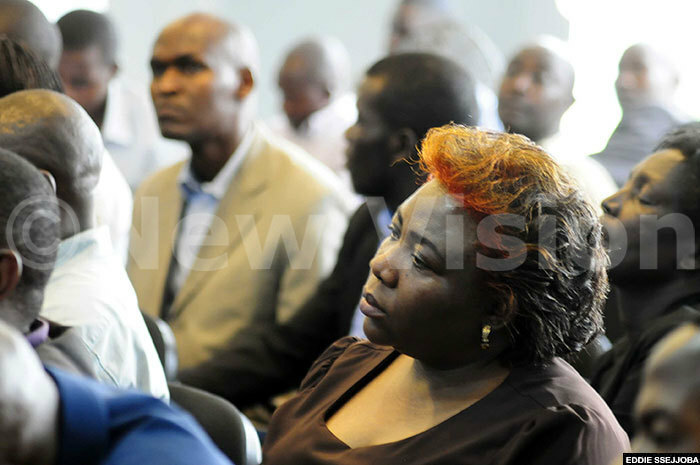
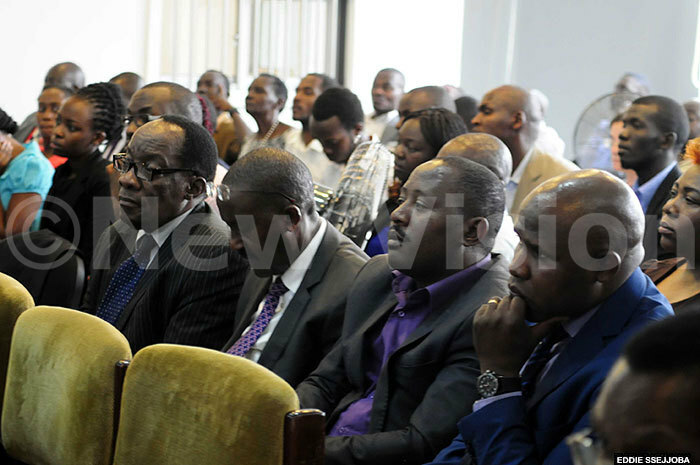
3.15pm: 'Inconsistencies'
Lady Justice Esther Kisakye [pictured below] points out some "inconsistencies" in the affidavit of Namugera, which at this point in the hearing (since starting on Monday) has been often cited.
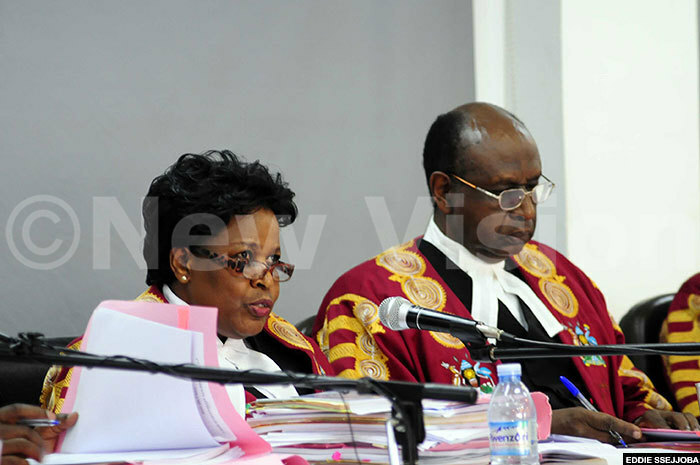
How would the head of technical services (Namugera), who is based in Kampala, know about the operations in other parts, she asks.
3.00pm: 'Much oliged my lord'
The Chief Justice, Bart Katureebe, says that it's "irregular" that the second respondent (Electoral Commission) claimed that it had given the petitioner's lawyers copies of the DR forms yet it hadn't.
He then directs the Electoral Commission to avail the petitioner's team with the copies. "Much obliged my lord," is counsel Tumusiime's response.
Katureebe then tells Mbabazi's lawyers that the second respondent will give them the said documents and that if they required more time to study them, the court would grant them more time.
Mbabazi's team also tells court that they want the biometric machines and clone results to be presented in the Supreme Court. Twinobusingye says that both hard and soft copies of the DR forms relied on to declare the presidential results are useful.
2.50pm: Inspection
Mbabazi's lawyer Severino Twinobusingye steps in and insists that they went to the Electoral Commission head offices (along Jinja road in Kampala) to inspect the documents but that "we did not find them substantial". He says they are yet to receive copies of the declaration of results (DR) forms as they had asked.
"How does the counsel expect us to respond to documents they have failed to give us?" asks the petitioner's lawyer.
2.40pm: 'Dangerous' statement
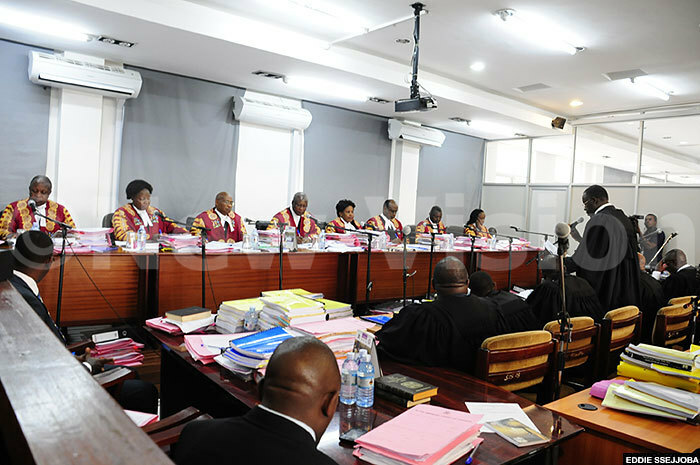
Tumusiime tells court that there was no vote that was not counted on the evening of the day of polling (February 18) as required by the law. Mbabazi, in his petition, claims that without declaration of results (DR) forms from the 28,010 pollings stations across the country, there were no poll results.
Counsel Tumusiime also argues that the petitioner did not have agents at half the polling stations, according to Electoral Commission boss Eng. Badru Kiggundu.
Counsel Tumusiime says that the petitioner saying that the Electoral Commission announced NRM candidate Yoweri Museveni winner without results is a "very dangerous" statement. Results were announced immediately after being cast at each polling station, the lawyer tells court.
|
2.30pm: COURT BACK IN SESSION
Bellies full, check. Your internet working well, check. Let's get back to court business then. Counsel Tumusiime, representing the second respondent (Electoral Commission), carries on with his submission. 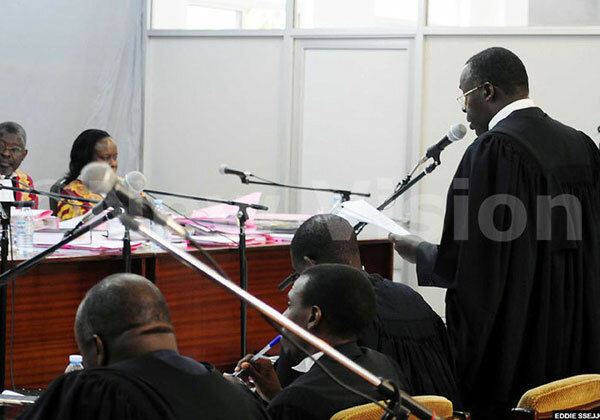
|
|
1.40pm: Tête-à-Tête: What are they saying?
If I had prizes here with me, I would put them up for grabs for anyone who guessed right what conversations are going on in these pictures below at the Supreme Court . . . 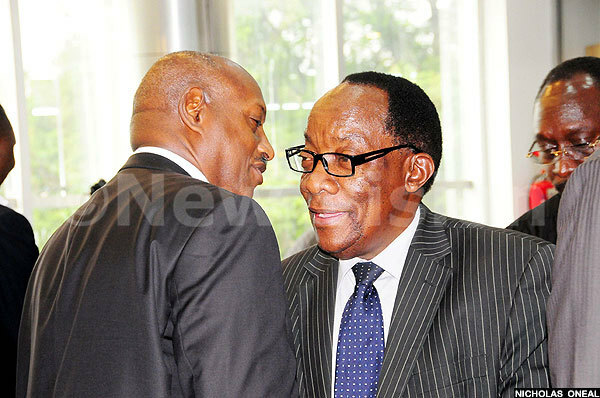 Attorney General Fred Ruhindi and Electoral Commission chairman Eng Badru Kiggundu
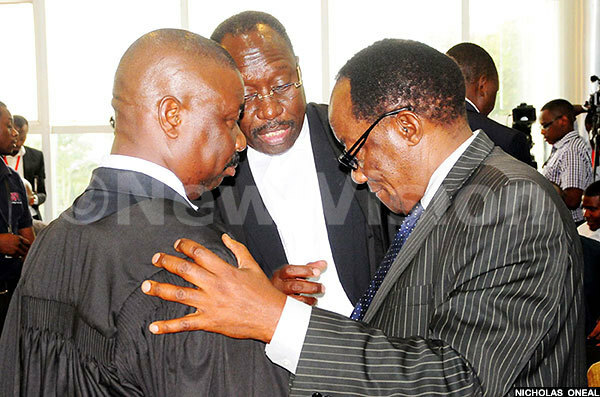 From left, Deputy Attorney General Mwesigwa Rukutana (left), Solicitor General Francis Atoke and Eng. Badru Kiggundu
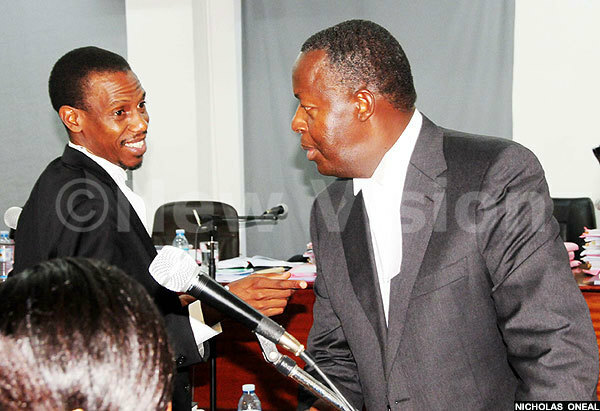 President Museveni's lawyers Kiwanuka Kiryowa (left) and Electoral Commission lawyer Enos Tumusiime (also below)
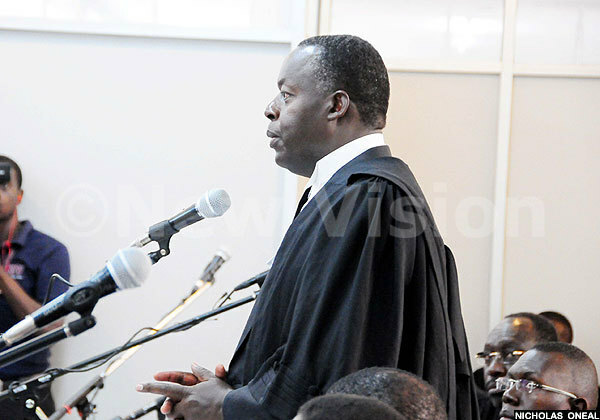
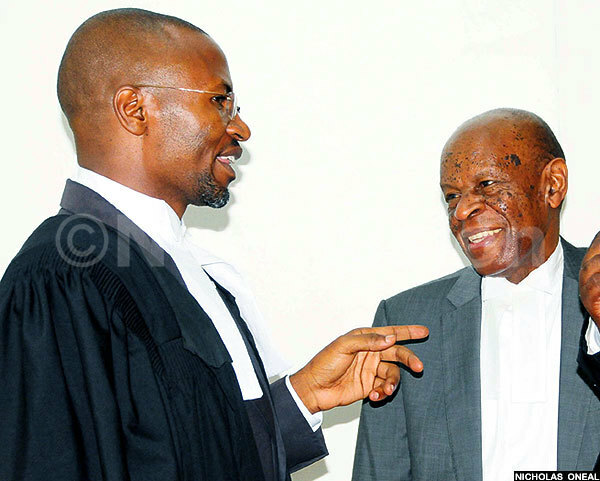 Electoral Commission lawyer MacDusman Kabega (R) and Mbabazi's lawyer Severino Twinobusingye
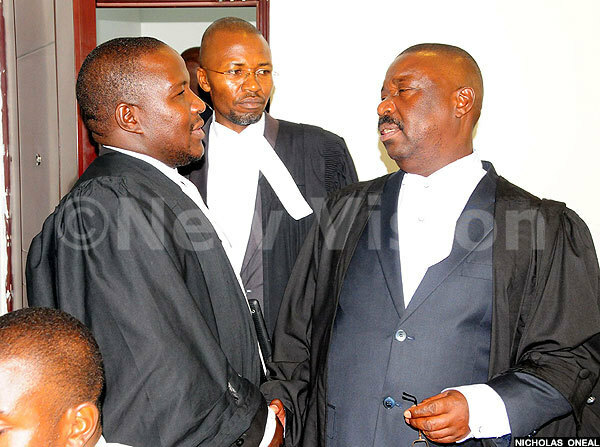 Petitioner Amama Mbabazi's lawyers Asuman Basalirwa (left) and Severino Twinobusingye (middle) with Deputy Attorney General Mwesigwa Rukutana
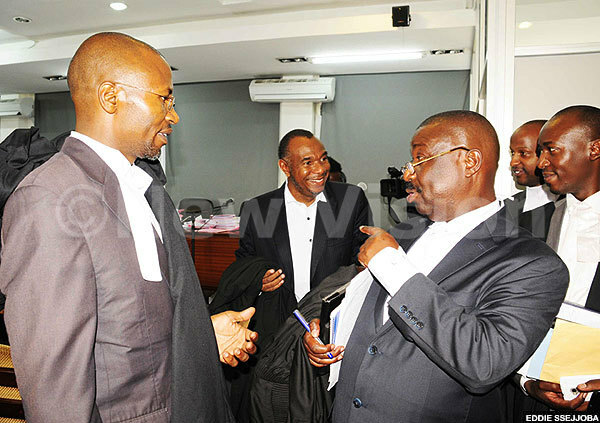 The Deputy Attorney General and Mbabazi's lawyers
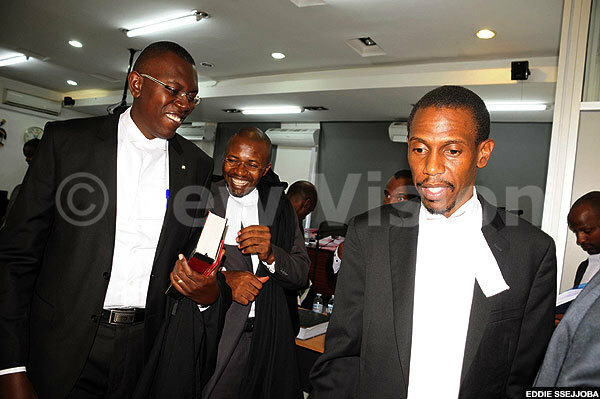
|
1.25pm: Play catch-up
Your first time here? Been too busy to follow the hearing? No worries. You can still go back in time and use this lunch time break to refresh yourself with how the hearing has been progressing through the week. Click on the links below for the pages . . .
Pre-hearing
Day One
Day Two
Day Three
|
12.50am: COURT GOES FOR ANOTHER BREAK
Time for lunch. Get some lunch people, fill your bellies. 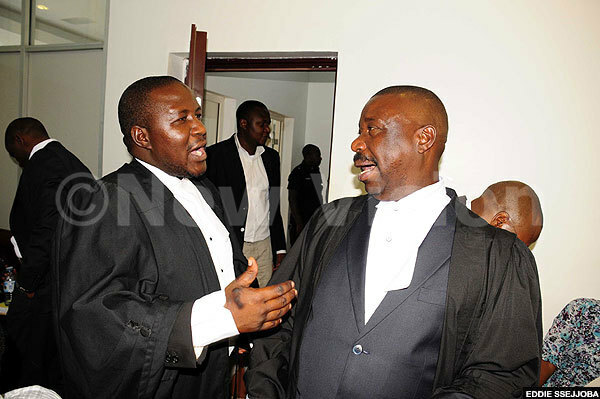
|
12.45pm: Media coverage
The petitioner complains that particularly two media houses, UBC TV and New Vision, had unfair coverage of the presidential campaigns, insisting that they gave the incumbent Yoweri Museveni (who is the first respondent in this hearing) wider coverage.
In response to this allegation, Tumusiime tells the High Court that the Electoral Commission is not responsible for the decisions made by the mentioned media establishments. He says that the two media houses are not parties to Mbabazi's petition and are being accused without being given an opportunity to defend themselves.
12.40pm: Social media
Tumusiime argues that the blocking of social media (Facebook, Twitter and WhatsApp) did not stop anyone from voting and so the blockade never disenfranchised any voter. He gives himself as an example, saying that majority of those who voted do not used social media.
The lawyer's submission is that the blockade by the Uganda Communications Commission (UCC) was justified and that the reasons given had the potential of disrupting the polls.
He further argues that the polling officers were able to scan the DR forms and email since the internet was working.
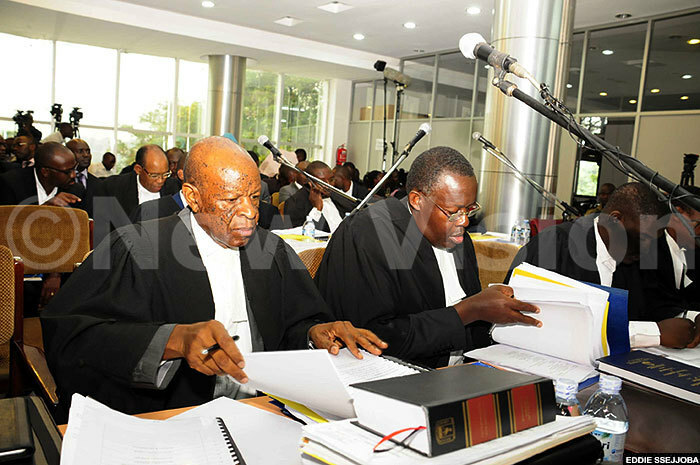
12.30pm: Machines v register
Tumusiime submits that the voting process in the February election complied with the Constitution, the Election Act and the Presidential Elections Act.
Was the petitioner prejudiced by the use of biometric technology? Remember that according to petitioner Amama Mbabazi, with the use of the biometric machines, only seven and a half million of the 15-plus million registered voters were verified if it took two minutes, as is claimed (Kiggundu says it took 30 second), to verify each voter.
According to the second respondent (Electoral Commission), the biometric system eliminated multiple voting, impersonation and confirmed a voter's actual polling station. The election body says that the Sim cards of the biometric machines were not to transmit data because they would be prone to hacking.
In an affidavit of a polling officer, a one Kabasinguzi, six people had national IDs but were blocked from voting because the biomeric system showed that they had not registered for voting - something the Electoral Commission pointed at as a success story of the biometric technology.
Earlier, the Chief Justice asked Tumusiime if the biometric system was functional at every polling centre. The Electoral Commission lawyer says that in one case, a biomeric machine failed to work but was fixed. He goes on to say that at the centres where the technology failed to work, the national voter's register was used with the help of the national identity card.
Tumusiime submits that the biometric machines were not intended to transmit results and neither were they meant to replace the national voters' register but rather, to complement it.
12.20pm: Biometric machines
Tumusiime tells court that the employment of the biometric voter verification kits by the Electoral Commission helped eliminate all the problems that petitioner Amama Mbabazi is indicating in his petition.
Among these "ills" are ghost polling stations, multiple voting and voting before and after the official time.
Did the biometric machines work at each polling station? The Chief Justice asks Tumusiime.
"My lord, I am coming to that," is the lawyer's response.

In light of the complaints raised by the petitioner, Tumusiime tells court that the Electoral Commission has the power to resolve complaints on irregularities, but says that the election body did not receive any from petitioner Amama Mbabazi.
Tumusiime reads before court a High Court ruling in which a petitioner's sympathizer lost, because he did not submit his electoral complaint to the Electoral Commission first.
Justice Mwanguhya, one of the judges on the nine-strong coram, asks: "Would the fact that petitioner did not raise the said complaints before the Electoral Commission mean that he can't raise them here?"
Amama Mbabazi's lawyer Severino Twinobusingye responds that the Electoral Commission officials declined to listen, hence going to High Court.
12.10pm: Large volume of work
Counsel Tumusiime refers to an affidavit of a one Mulekwa in which he says that the old declaration of results (DR) forms were prone to being easily tampered with, on top of requiring manual entry, something that, compared to the new design, caused delays.
The Electoral Commission lawyer re-echoes the argument that the Commission apologised for the delays but that they did whatever they could to ensure that every registered voter had a chance to cast their ballot.
Chief Justice Bart Katureebe asks Counsel Tumusiime when the printing of the DR forms was completed, to which the second respondent's lawyer responds: "It was completed a day before polling date".
Katureebe also asks the lawyer why it took a longer time to print DR forms for Wakiso and Kampala than elsewhere.
Tumusiime responds that the printing of the DR forms of these two areas was completed prior to the day of polling but that the huge amount of work is what delayed delivery.
11.50am: 'Gigantic task'
It is a "phenomenal and gigantic task". That's what Counsel Tumusiime is calling the process of distributing voting materials to the polling stations around the country, and asks the Supreme Court to recognize that. He says that mitigation measures following the setback were successful in both Wakiso and Kampala districts.
In Wakiso, Tumusiime tells court, the turn-out was 53.84% compared to 47.53% in the previous election in 2011 and that in Kampala, the voter turn-out was 51.48% compared to 42.5% in 2011.
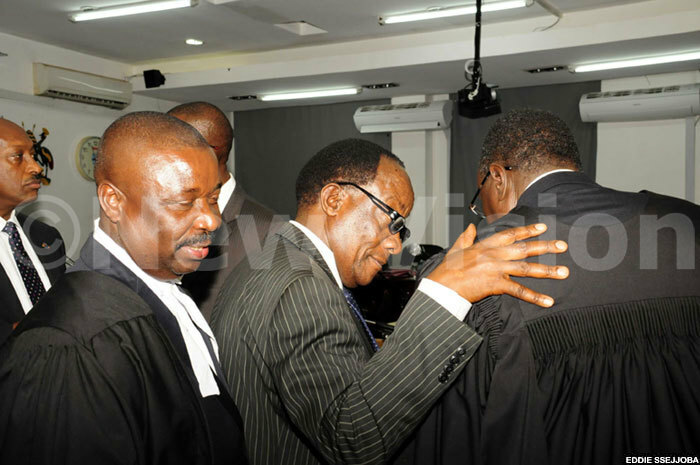
PAT OF CONFIDENCE: 'I know we will win this.'
Whatever Eng. Kiggundu is telling EC lawyer Tumusiime earlier here coming from the break, it could be in those lines . . .
11.40am: Delays were not deliberate - EC
Tumusiime refers to Electoral Commission boss Eng. Badru Kiggundu's affidavit in which he says that the Commission delivered voting materials on time in all but two districts, that is Kampala and Wakiso. And for those two areas, the election body apologized for the late delivery of materials.

Tumusiime tells court that the delayed delivery of voting materials in Kampala and Wakiso districts was due to a miscalculation of the time needed to execute reforms to the declaration of results (DR) forms.
The lawyer says that no delays were intentional or deliberate.
11.35am: Voting materials
In his petition, Mbabazi alleges that the Electoral Commission delivered voting materials late and voting did not kick off until 2.00pm local time.
Tumusiime says that the Electoral Commission's stance is that only authorized people handled the ballot boxes plus other voting materials. He also asks the Attorney General to look into the two provisions in the Presidential Elections Act on the periods within which voting materials should be delivered. Is it 48 hours, or 24 hours?
|
11.30am: COURT BACK FROM BREAK
The 30-minute break is done.
|
|
11.00am: BREAK TIME
The Supreme Court goes for a short break.
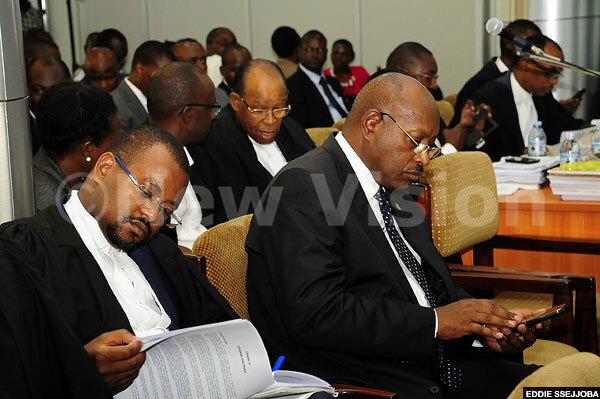
|
10.55am: Museveni's nomination
On the allegation of illegal nomination of Yoweri Museveni, Tumusiime uses the law, the Presidential Elections Act to be precise, to make his defence.
He says that Section 9 of this law on sponsorship of candidate by a political party was enacted 11 years ago (in 2005) as "we were going into multipartism".
He cites Section 10 of the same act, which says that a person shall not be a candidate if nomination papers are submitted late. The same section says that when person is sponsored by a party, he or she needs to provide evidence of endorsement.
According to Section 11 of this law, a candidate will not be nominated if his or her nomination paper is not signed, lacks 100 signatures and has not the paid required fee.
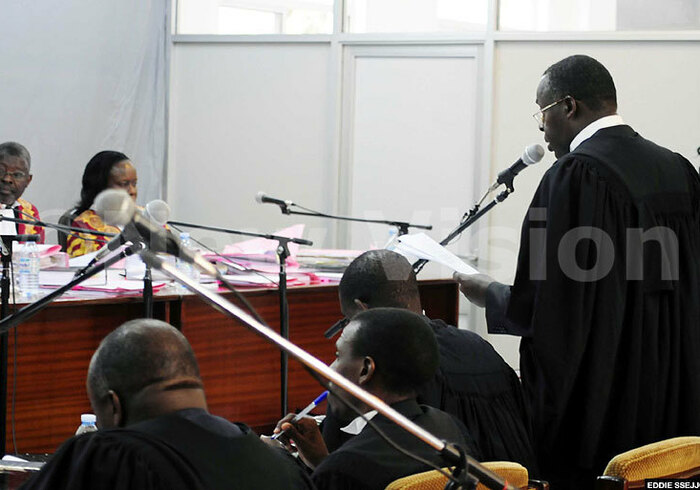
Tumusiime submits that he will tell court where the petitioner, Amama Mbabazi, did not comply with the rules of nomination as well. In his petition, Mbabazi says that Museveni was nominated before his party had endorsed him, adding that the Electoral Commission acted illegally when it extended the nomination dates.
Tumusiime argues that Museveni was duly nominated by his party, the NRM, and that the nomination period was not pushed to favor him. The lawyer tells court that the Electoral Commission did not extend the nomination dates to accommodate NRM's Yoweri Museveni, who is the first respondent, but to allow for Parliament to pass the amended Presidential Elections Act.
Also, his argument is that the law does not cite anywhere one not being endorsed by one's party before nomination by the Electoral Commission as cause for invalidation of an election.
10.40am: Retiring old register
On the issue of illegal retirement of the old national voters' register as raised in the petition, Tumusiime highlights what the law says about the functions of the Electoral Commission: to "compile, update and maintain" are words predominantly used, argues Tumusiime.
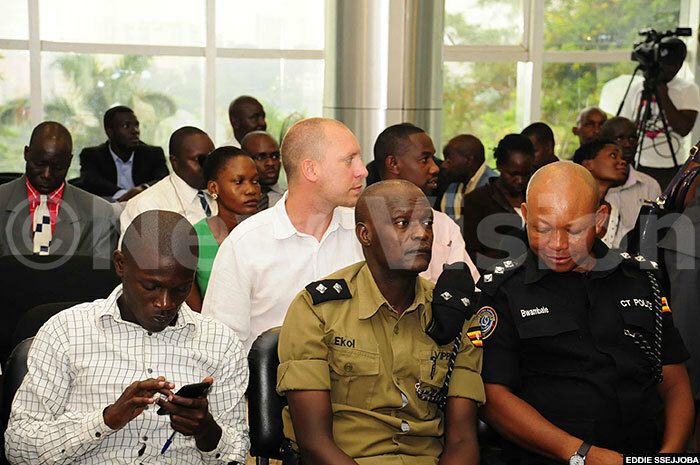
The Electoral Commission lawyer adds that the Electoral Commission did not do the updating of the register in the dark. He tells court that the Eng. Badru Kiggundu-led Commission made public efforts of compiling the new voters' register, and due to a high turn-out, the election body extended the period for fresh registration until May 11.
Tumusiime's argument is that if Amama Mbabazi, in his petition, alleges that there was no voters' register, what, then, was being used for voters to cross-check their particulars?
Tumusiime uses irony as a tool in his argument by saying that they find it ridiculous that the petitioner dismisses the national ID in the electoral process yet he attaches ID numbers in his affidavits. As such, he submits that the second respondent (the Electoral Commission) did not fail to compile a national voters' register and "so we pray that you so hold".
10.32am: National ID, voters' register
The petition questions the spirit in which the national ID was used in the election process. In defence, Tumusiime tells court that the Electoral Commission wishes to dispel the claim that the national ID was meant for purposes other than the electoral process.
He also adds that the Commission compiled and updated a voters' register as required by the law, and so "we refute the allegations made by the petitioner about the same issue".
The Electoral Commission displayed the national voters' register and called on voters to identify their details, says the Electoral Commission lawyer. He tells court that the the registration for the national ID aimed at capturing various data including fingerprints, and that during this process, the government incorporated provisions for information required by the Electoral Commission to extract its own national voters' register data.
To consolidate his argument, Tumusiime says that staff of the Electoral Commission helped in capturing national ID data at the grassroots level.
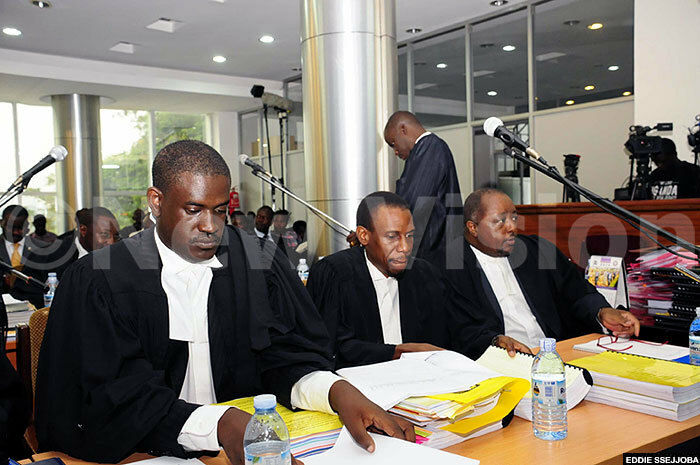
10.20am: Poll 'not a one-day event'
One of the functions of the Electoral Commission, Tumisiime tells an attentive court, is to make sure that candidates campaign in an orderly manner and respect each other. The February 18 election, he tells court, was a process that had began right from the time the previous election (2011) ended. It was not a one-day event, he says.
He goes on to point out that petitioner Amama Mbabazi makes a number of claims to do with the powers of the Electoral Commission and that it is his duty to tackle them.
Among the complaints in Mbabazi's petition is about the voters' register. Citing the affidavit of the Electoral Commission head of elections management, Joshua Wamala, Counsel Tumusiime says that some two and a half million ghost voters were weeded out when the national voters' register was updated.
10.10am: He 'lied'
The lawyer of petitioner Amama Mbabazi, Severino Twinobusingye cuts in and tells court that Electoral Commission lawyer Tumusiime wrote to court and "lied" that Mbabazi's team had inspected documents and taken them. He asks for the Supreme Court's intervention on this issue.
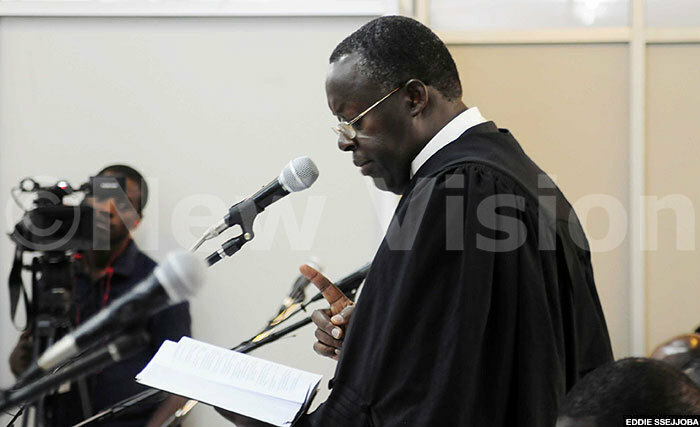
In response, Chief Justice Bart Katureebe says that he had told the two teams to meet and discuss the matter to save time. After saying this, he tells lawyer Tumusiime to carry on with his submission.
His submission is on whether the Electoral Commission he is representing followed the law during the election period. He is putting into perspective the relevance as well as the roles of the Electoral Commission.
9.55am: Starting off
As I mentioned earlier, the Electoral Commission team is led by Enos Tumusiime, who takes his place on the mic to make his submission.
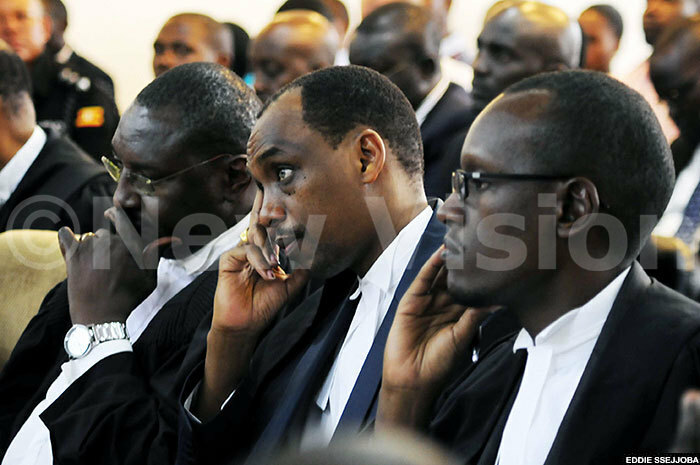
The other lawyers on the Electoral Commission team are Eric Sabiiti, Ivan Kyateka, Elison Karuhanga and Tom Magezi. The chairman of the Electoral Commission, Kiggundu, as you saw earlier, and the Commission's secretary, Sam Rwakojo, are seated put in the packed courtroom.
|
9.52am: HEARING UNDER WAY
The Supreme Court is now in session after the nine faces on the coram we have already seen a lot this week walk in. Everyone is on their feet as the judges march in and before they take their seats, the lawyers make a bow.

|
9.35am: Ready! . . . steady! . . .G-O!
Eng. Badru Kiggundu. This man, we've seen him already. On Monday, he did a lot of talking in the witness stand as he was cross-examined. Today, it will be the lawyers representing the body he heads [Electoral Commission] doing much of the talking. For now, the engineer, already eased into his seat, can afford a grin.
He appears to be in good spirits!
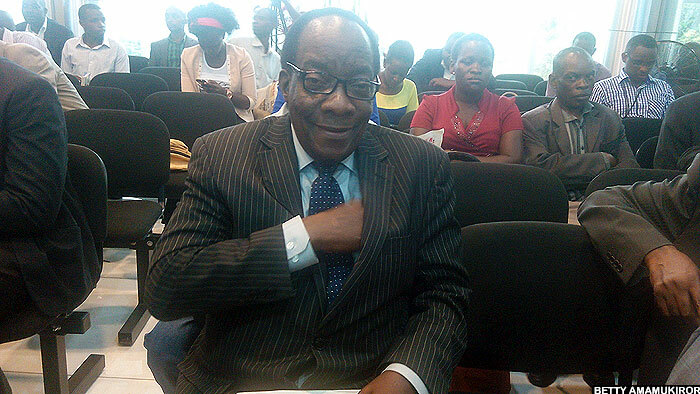
9.25am: Pep talk
The Electoral Commission lawyers are seen here in deep consultation as they prepare to put up a spirited defense against allegations leveled against them by Amama Mbabazi in his election petition.
They are expected to convince the Supreme Court to dismiss the allegations therein.
We should start any time from now . . .
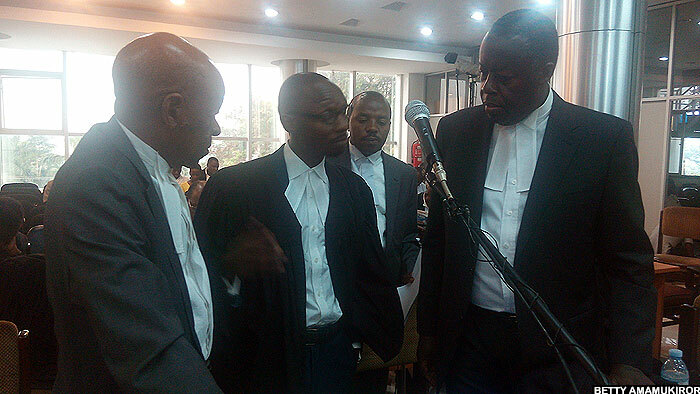
9.18am: Today's edition
In case you were busy doing some errands around town on Wednesday and failed to follow what transpired in the courtroom, THIS PAGE should bring you up to speed on that.
Or, you can check out today's New Vision newspaper for just that . . .
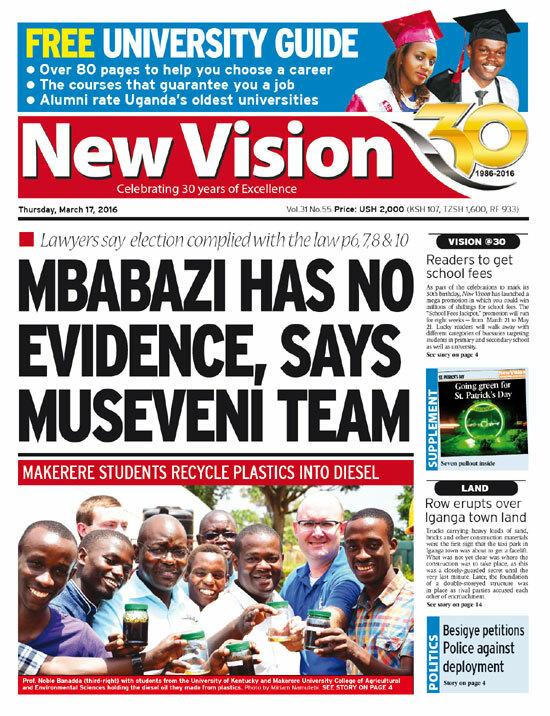
We've also got a digital version of the entire New Vision paper. CLICK HERE TO SEE IT
|
9.10am: GETTING SET
The Electoral Commission team, led by lawyer Enos Tumusiime, are already in court. They are expected to submit their defense today. 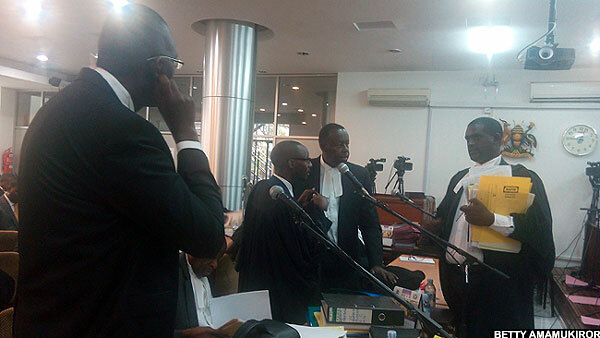
|
9.00am: Good morning
A week of court? Yes, that's what-it-is.
Good morning, and what a cloudy Wednesday morning we've got here in Kampala!
Welcome to yet another text commentary of the Supreme Court hearing of an election petition by former Prime Minister Amama Mbabazi who was a candidate in the recent-concluded presidential race. The hearing started on Monday this week, and we've since seen the Electoral Commission chairman Eng. Badru Kiggundu cross-examined, the petitioner making his submissions as well as the first respondent (President-elect Yoweri Museveni) making his submissions.
Today, we will see the second respondent (the Electoral Commission) bring forward its submissions before a court of nine judges headed by Chief Justice Bart Katureebe.
Let's build up . . .